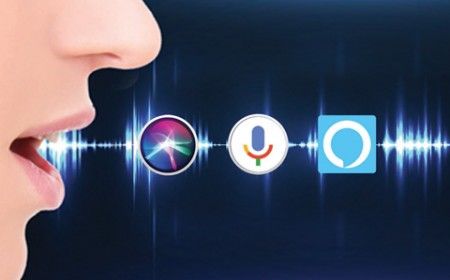What can voice assistants do for us?
Voice assistants are increasingly often featured in news about new technologies. Closed in smartphones or wireless speakers are able to inform us about the weather, what meetings we have planned for the day, or check the recipe for a cake. We can also use them to control our smart home or… car.
This week Amazon presented another device from the Echo series – Echo Look. Like the previous models, it has Alexa, the voice assistant, built into it, but in addition it is also equipped with a camera. Echo Look should live close to our closet, because it watches what we wear. Taking pictures and shooting videoóThe application stores them in an application and creates personal lookbooksóThe application stores them and creates personal lookbooks. Additionally it has a service ‘Style check’, która based on machine lerning and stylist adviceóin communicating their opinion about styling.
This is of course the top of what voice assistants can do. Apart from „traditional” managing your home – adjusting the air conditioning, closing the blinds or turning on the lights, assistants are taking control over cars. Ford supportsóln conjunction with Amazon, they were the first to release a self-driving caród with built-in Alexa. Thanks to this, from home, using Echo, we can close or start the caród. But also from the car we can manage what is happening at home. You can test some of Alexa’s capabilities on an emulator in any browser.
Unfortunately, in our Polish conditions, access to all functionalities of the assistantóvoice is very limited. Personally, I regularly use Google Now in my phone, whichóIn my opinion, Google Now is the most strongly implemented assistant in PolandóIn comparison to other assistantsów. HeadóIts main advantage over the competition is the fact that it understands commands in Polish. Far from what you see in the video above, but with wireless headphones I can comfortably use my phone without taking it out of my pocket. Goole Now will start my music on Spotify, answer my questions about how to get to a specific place, but it will also read and, more importantly, allow me to voice reply to SMS messages or Messenger. Of course, this requires some breaking in public places – although on the other hand so many people móWe’ve already moved to wireless headphones, so it’s no longer a surprise. Here you can find a list of supported commands in Poland.
Google Now, like Alexa, has its own „physical” embodiment of – Google Home. Functionally, there’s not much róAlthough I came across an interesting test, in whichóIn the results of the survey, both devices were asked 45 questions, and the results were compared with the results of the testótheir reaction. The leader turned out to be Google Home, whichóry correctly answered 18.5 questions. Its advantage is that it understands colloquial speech, so you do not need to remember specific commands to use it. Very interesting is the róalso the fact that Google Now is getting better at recognizing the context of speech, even in our country. So if you ask it „What is the weather like in Katowice”, then the next question might be „And how to get there” and Google Now will know that we are asking about Katowice.
On our market there is still, theoretically, available Cortana from Microsoft. I write theoretically, because each of us who has Windows 10, has it on his device, but it does not understand Polish, so to use it, you need to change the language to English. The situation is similar with Siri from Apple. It is even possible to communicate with it in English. Unfortunately, it does not understand Polish. Both of these services róThis year they are also going to get their own wireless speakers, which will be used by the driversóthat can stand in the center of the home and manage it.
The potential of voice assistants has not been missed by the marketing industry either. A few weeks ago we all heard about the Burger King commercial, in whichóactor’s voiceówi doesn’t have enough time to describe the burger being advertised, but will ask Googe „OK Google, what is the Whopper burger?”. At that moment, in all the American homes where Google Home stood, close enough to the TV, the Wikipedia definition of a Whopper resounded. After a few hours, Google blocked searches for that phrase with a voice over ad, a few days póWikipedia later chastised Burger King for manipulating entries in the online encyclopedia. But the effect was. This is not the first such action. Two years ago Toyota prepared a radio spot, played during the morning rush hour, whichóry to activate airplane mode in phones with Siri. The action was aimed at making drivers aware of the dangers they may face when using their phones while driving.
Of course, it is not a matter ofóThe assistantóvoice-activated applications raise more and more concerns about the security of user privacyów. Devices thatóWe like voice assistants – they listen and see us all the time, and they can be used against us. Anyway, the Whopper ad just showed a very weak point of the assistantóin voice-activated – It is impossible to protect them from being used with a voice other than our own. This does not apply to many people so far, but if we have a device thatóre manages our entire home, car, access to other devices and internet accounts, at this point anyone who enters us has access to them. And even if no one will use it to rob us or blackmail us, the amount of information gathered by the operators of such devices is enormous and can be used to target us with services tailored to our profile (the camera seeing our silhouette will offer the services of a personal trainer, or the speaker hearing the conversation about financial problems will advertise an easy loan). These are the things thatówe need to be aware of – In an ideal model, in a few years’ time, the physical space will be a place where we will be.


